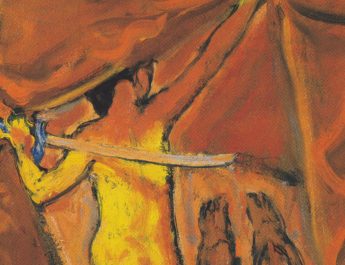Psalm 119:33-40
Proper 18A
33 TeachA me, O Lord,B the wayC of your statutes,D
and I will observeE it to the end.F
A “teach” = yarah. This is to throw, shoot, be stunned. It is to flow as water so figuratively to instruct or teach. This is the same root that “Jerusalem” and “Torah” draw from.
B “Lord” = YHVH. From the same as YHVH (the name of the God of Israel, the self-existent and eternal one, the tetragrammaton; pronunciation has been lost to time so “Lord” is generally used in its place); {from havah (to be, become) or hayah (to come to pass, become, be)}. This is a secondary spelling of the Lord, the name of the God of Israel. It has the same meaning.
C “way” = derek. From darak (to tread, march, to walk. Can also mean affixing a string to a box since one needs to step on it to bend it in the process; so also an archer). This is a road as a thing that is walked on. Can be used figuratively for the path that one’s life takes or how one chooses to live one’s life.
D “statutes” = choq. From chaqaq (to inscribe, carve, or decree; a lawmaker; literally, this is engraving, but it implies enacting a law because laws were carved into stone or metal). This is statute, boundary, condition, custom, limit, ordinance It is something that is prescribed or something that is owed.
E “observe” = natsar. This is to watch, guard, protect. It can be positive – preserve or obey. It can be negative as conceal.
F “end” = eqeb. 15x in OT. Perhaps from aqab (to assail, supplant, overreach, follow or grab someone’s heel, to trip someone up); perhaps from aqeb (heel, hind part, hoof, rear guard of an army, one who lies in wait, usurper). This is a heel as the final part of something i.e. the result, consequence, or reward. It can also be used as an adverb to mean as ever.
34 Give me understanding,G that I may keepH your lawI
G “give…understanding” = bin. This is to discern, consider, attend to. It refers to distinguishing things in one’s mind or, more generally, to understand.
H “keep” = natsar. Same as “observe” in v33. See note E above.
I “law” = torah. Related to “teach” in v33. From yarah (see note A above). This is law, instruction, teaching, or statute. It can also refer to the first five books of the Bible – the Torah.
and observeJ it with my wholeK heart.L
J “observe” = shamar. This is to keep, watch, or preserve. It means to guard something or to protect it as a thorny hedge protects something.
K “whole” = kol. From kalal (to complete). This is all or every..
L “heart” = leb. May be related to labab (to encourage; properly, to be encased as with fat; used in a good sense, this means to transport someone with love; used in a bad sense, it can mean to dull one’s senses). This is the heart, courage, one’s inner self, the mind, or the will. Heart is only used in a figurative sense in the Old and New Testaments.
35 LeadM me in the pathN of your commandments,O
for I delightP in it.
M “lead” = darak. Related to “way” in v33. See note C above.
N “path” = nathib. This is a beaten path or a traveler.
O “commandments” = mitsvah. From tsavah (to charge, command, order, enjoin). This is a commandment, law, ordinance obligation, or tradition. It is something commanded whether by God or by a human authority. This term is sometimes used collectively to refer to the Law.
P “delight” = chaphets. Properly, this means inclined towards or bending to. Figuratively, it means to desire, delight in, or be pleased with.
36 TurnQ my heart to your decreesR
and not to selfish gain.S
Q “turn” = natah. This is to stretch or spread out, to extend, or bend. In can also imply moral deflection.
R “decrees” = eduth. From ed (witness, testimony, recorder); from ud (to admonish, repeat, duplicate, testify, restore, record, relieve). This is testimony, ordinance, decree, warning, or witness.
S “selfish gain” = betsa. From batsa (to break or cut off, to acquire violently, break ranks, greedy, fulfill; usually, it means to plunder). This is dishonest gain or gain from violence. It can also be plunder or profit.
37 TurnT my eyesU from lookingV at vanities;W
be gracious to meX according to your word.
T “turn” = abar. This is to pass over or cross over. It is used for transitions, whether literal or figurative. It can also mean to escape, alienate, or fail. This is the root verb from which “Hebrew” is drawn.
U “eyes” = ayin. This is eye in a literal or figurative sense so eye, appearance, favor, or a fountain (the eye of the landscape).
V “looking” = raah. This is to see in a literal or figurative sense so stare, advise, think, view.
W “vanities” = shav. Perhaps from the same as sho (ruin, desolation, storm; from a root that means rushing over – hence a storm and hence devastation). This is emptiness, false, worthless, deceit. It can also refer to evil, guile, idolatry, or something being in vain.
X “be gracious to me” = chayah. Some manuscripts literally “give me life.” This is to live or keep alive in a literal or figurative sense. So, it can be revive, nourish, or save.
38 ConfirmY to your servantZ your promise,AA
which is for those who fearBB you.
Y “confirm” = qum. To arise, stand, accomplish, establish, abide. This is rising as in rising against, getting up after being sick or asleep, arising from one state to another, becoming powerful, or rising for action. It can also be standing in a figurative sense.
Z “servant” = ebed. From abad (to work, serve, compel; any kind of work; used causatively, can mean to enslave or keep in bondage). This is a servant, slave, or bondservant.
AA “promise” = imrah. From emer (speech, thing, utterance, promise, argument, command); from amar (to speak, say, answer, command, promise, report). This is any kind of utterance, a word or commandment.
BB “fear” = yirah. From yare (to fear, be afraid, dreadful; also fearful reverence – to fear in a moral sense is to say to revere, respect). This is fear or reverence.
39 Turn awayCC the disgraceDD that I dread,EE
for your ordinancesFF are good.GG
CC “turn away” = abar. Same as “turn” in v37. See note T above.
DD “disgrace” = cherpah. From charaph (to expose and so figuratively to reproach, defame, carp at, defy). This is reproach, rebuke, shame, or disgrace. It can also refer to genitals.
EE “dread” = yagor. 5x in OT. This is to fear or be in dread.
FF “ordinances” = mishpat. From shaphat (to judge, defend, pronounce judgment, condemn, govern). This is a verdict or formal sentence whether from humans or from God. It includes the act of judging as well as the place that judging takes place, the suit itself, and the penalty. Abstractly, this is justice, which includes the rights of the participants.
GG “good” = tob. From tob (to be pleasing, to be good). This is good, beautiful, pleasant, agreeable, bountiful, at ease. This word is used for goodness as a concept, a good thing, a good person. This can refer to prosperity and welfare as well as joy, kindness, sweetness, and graciousness. So, this is ethically good, but also enjoyably good.
40 See,HH I have longedII for your precepts;JJ
in your righteousnessKK be gracious to me.
HH “see” = hinneh. From hen (lo! Behold! If, though; an expression of surprise). This is to draw attention, show suddenness or surprise, or to emphasize the importance of the coming statement. See! Lo! Behold!
II “longed” = taab. 2x in OT – both in Psalm 119. This is to long or desire.
JJ “precepts” = piqqud. From paqad (to attend to or visit – can be used for a friendly or violent encounter; to oversee, care for, avenge, or charge). This is something that is appointed or decreed by God. It can refer to the Law as a whole or a commandment individually.
KK “righteousness” = tsedaqah. From the same as tsedeq (rightness, righteousness, vindication. It is everything that is just or ethical. That which is right in a natural, moral, or legal sense. It also includes just weights (i.e. true weights). Figuratively, this is justice, righteousness, equity – even prosperity). This is righteousness, justice, righteous acts, and moral virtue.
Image credit: “Sculptural Erosion” by Rod Waddington, 2017.




